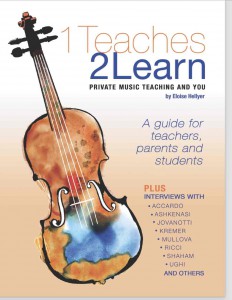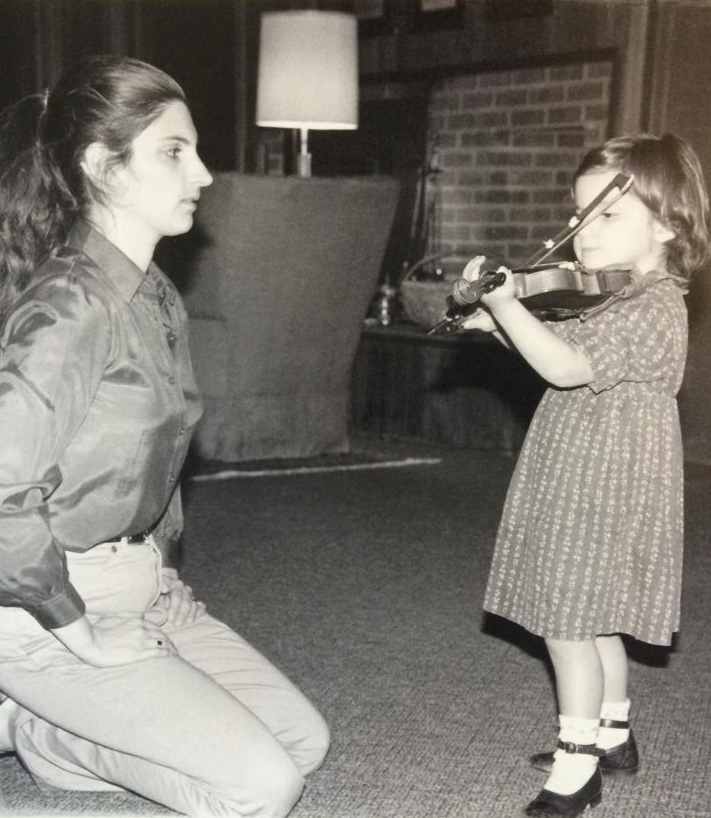Intonation: Tin Ear or Attuned One?
"I have an 8-year-old student who can’t hear the difference between a semitone and whole tone. I’m at my wit’s end: I have tried everything I can think of to activate her ear, but she still says that those tones sound identical to her. What to do?"
I can certainly understand this teacher’s desperate plea for help on an Internet forum. I, too, have had students like this.
First of all, I would like dispel a notion that some put forward on this thread: that she’s tone deaf or note deaf.
I looked it up: tone deafness only afflicts 4% of the population. However, the article I read (see "Amusia" in Wikipedia) says that those afflicted with a "tin ear" do succeed in speaking tonal languages, which suggests that distinguishing between notes may be a learned skill.
It also refers to experienced musicians, such as W. A. Mathieu, insisting that tone deafness in adults can be corrected with training. In fact:
“Mathieu enjoys sharing his tuning expertise with others, including beginners—and especially those who are convinced they are tone-deaf. ‘Nobody is tone-deaf,’ he claims. He has regularly trained his ‘Tone-Deaf Choirs’ to sing in tune, often in public.” (see Wikipedia, "W. A. Mathieu")
If you can train adults, why not children?
But why isn't this common knowledge among teachers?
Would so many commenters on that post suggest telling the child to change instruments if they knew about this? Also, do we have any idea how damaging it can be to a student for us to tell his parents that their child has a problem and should change instruments? Have we considered that there may be a reason the parents wanted their child to study the violin in the first place? Perhaps they're aware of his intonation problems and think a stringed instrument might help. Perhaps the child asked to play the violin. How would you have felt if someone for any reason (but mostly because of a firmly held but unproven opinion) had told your parents that you should switch instruments?
Consider what the result of such advice could be in some cases: parents stopping music lessons altogether because they think the teacher, whom they hold to be an expert, is really telling them that their child is deficient or incapable, and therefore the teacher doesn't want to teach their child. What you mean when you talk to parents and what they may understand can often be polar opposites.
I can tell you about my experience with such students. What I found out by observation and a little reading up on the subject (which was difficult in the days pre-Internet—now there's no excuse) is that their mothers had sung lullabies to them out of tune and with very little voice modulation. However, all of them, parents and children, had learned to speak their mother tongue with appropriate fluctuations in their voices and local accents. Those students, who couldn’t hear the difference between C and C sharp at the beginning, later learned to, though. It takes time and persistence on both parts. What did I do? I asked them to put their fingers in the right place (second finger close to the first or close to the third, for example), using tapes at first, and they eventually heard the difference. What I didn’t do was make a bigger deal out of that than I did their bow hold or posture. Why? Because it’s important that students don’t think that they can’t do something or that something is the matter with them. You have to use a gradual approach.
I remember being very amused by one little girl’s solfège teacher who heard her play after years of lessons with me. “My what great intonation!” he said admiringly. He had no idea of her initial problem, and I remember feeling quite smug.
You might ask me why I am so convinced that a child’s ear can be trained? Because of my experience learning a foreign language. In English we don’t pronounce double consonants, but in Italian it’s obligatory or the meaning of the word changes. I could never hear the difference and, frankly, I didn’t think it was so important until I was finally made to understand just how drastically different the meaning could be (even from decorous to vulgar) to a sensitive Italian ear with the addition of one little seemingly (to me) insignificant consonant. Then I started listening attentively. It took a good while, but now I can hear it quite well. You would think that someone who can hear the difference between 440 and 441 Hz at 100 paces wouldn’t have had a problem with this, but I did and sometimes still do. It’s because I learned the language as an adult. If I had only heard Italian when I was little… So that’s why I have great sympathy for anyone who wants to play the violin but has a problem distinguishing tones. I am just like them—only in language, not music. As a result, I don’t give up on them just like I don’t give up on myself.
Some students will always have a better ear than others. Also, there is never an ironclad guarantee that any student will always play reliably in tune no matter how good their ear is. I have had more than one student with perfect pitch to whom for years intonation was of little importance. Just because a student hears that he's out of tune doesn't mean that he will bother to do something about it. But starting with a poor ear doesn’t mean that a child is incapable of achieving some level of proficiency on the instrument. Everyone I taught eventually learned to hear the difference between half steps and to play musically. So, how can we possibly know at the beginning who will develop a great ear and who won’t? Who will work hard and who won’t? Who will care about playing in tune and who won’t? And who are we to deny the pleasures of playing the violin to a child?
Let’s not fall into the trap of presuming that talent shows up right away or that a good ear is immediately apparent and cannot be developed. Yes, intonation is important, but if we let a student in difficulty get hung up on it, if we discourage her from playing, she will surely never develop her ear.
Besides, what violinist doesn’t have a problem of one sort or another with intonation? Do we always play completely in tune?
Scales anyone?
Share this:
Buy it on www.sharmusic.com - eBook format, avaliable worldwide, paperback in North America
COPYRIGHT
ABOUT
A music teacher’s thoughts and observations on the teaching and the study of a musical instrument, hoping to be of help to parents, students and teachers.
PHOTO
AWARDED TOP 25 VIOLIN BLOG
CATEGORIES
TAGS
ARCHIVES
-
Agosto 2022
Agosto 2023
Agosto 2024
April 2015
April 2016
April 2017
April 2019
April 2020
Aprile 2022
Aprile 2023
Aprile 2024
August 2014
August 2015
August 2016
August 2017
August 2018
August 2019
August 2021
December 2014
December 2015
December 2016
December 2017
December 2018
December 2019
December 2020
Dicembre 2022
Dicembre 2023
Dicembre 2024
Febbraio 2022
Febbraio 2023
Febbraio 2024
February 2015
February 2016
February 2018
February 2019
February 2020
February 2021
Gennaio 2022
Gennaio 2023
Gennaio 2024
Giugno 2022
Giugno 2022
Giugno 2023
Giugno 2024
January 2015
January 2016
January 2017
January 2018
January 2019
January 2020
July 2015
July 2017
July 2019
June 2016
June 2017
June 2018
June 2019
June 2020
June 2021
Luglio 2022
Luglio 2023
Luglio 2024
Maggio 2022
Maggio 2023
Maggio 2024
March 2015
March 2016
March 2017
March 2018
March 2019
March 2020
March 2021
Marzo 2022
Marzo 2023
Marzo 2024
May 2015
May 2016
May 2018
May 2019
May 2020
November 2014
November 2015
November 2016
November 2017
November 2018
November 2019
November 2021
Novembre 2022
Novembre 2023
Novembre 2024
October 2014
October 2015
October 2017
October 2018
October 2019
October 2020
October 2021
Ottobre 2022
Ottobre 2023
Ottobre 2024
September 2014
September 2015
September 2016
September 2018
September 2019
September 2020
September 2021
Settembre 2022
Settembre 2023
Settembre 2024
RECENT POSTS
Terry G and Me, or Terry Gilliam on Where (or What) Practicing the Piano Will Get You…
The Teaching We Don’t Do Is More Important Than We Think
Overwhelmingness or What Teaching and Motherhood* Have in Common
Cellphone Serenity
How to Build Your Reputation – the Kind You Want
Desperate Times, Desperate Measures. Or How to Deal With Your Strong-Willed Stubborn Student and Survive
“Why Does My Teacher Get So Frustrated?” Letter to a Perplexed Student
Mount Rush-no-more….And How to Get There
Realizzato con VelociBuilder - Another Project By: Marketing:Start! - Privacy Policy




